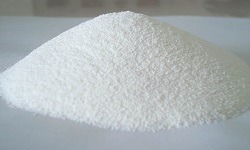IUPAC Name
Potassium Sulphate
Cas Number
7778-80-5
HS Code
3104.30.00
Formula
K2SO4
Appearance
White Powder
Common Names
Sulphate of Potash
Packaging
25 Kg Bag
Brief overview
Potassium sulfate (K2SO4) (in British English potassium sulphate, also called sulphate of potash, arcanite, or archaically known as potash of sulfur) is a non-flammable white crystalline salt which is soluble in water. The chemical is commonly used in fertilizers, providing both potassium and sulfur.
Manufacturing Process
The process for manufacturing potassium sulfate is similar to that used for the manufacture of sodium sulfate. Potassium sulfate can be synthesised by reaction of potassium chloride with sulfuric acid according to the Leblanc process. Potassium sulfate is produced according to the following reaction:
2 KCl + H2SO4 → 2 HCl + K2SO4
The Hargreaves process uses sulfur dioxide, oxygen and water and potassium chloride as the starting materials to produce potassium sulfate. Hydrochloric acid evaporates off. SO2 is produced through the burning of sulfur.
Agriculture Industry
The principal use of potassium sulfate is as a fertilizer. K2SO4 does not contain chloride, which can be harmful to some crops. Potassium sulfate is preferred for these crops, which include tobacco and some fruits and vegetables. Crops that are less sensitive may still require potassium sulfate for optimal growth if the soil accumulates chloride from irrigation water. The crude salt is also used occasionally in the manufacture of glass.
Other Applications
Potassium sulfate is also used as a flash reducer in artillery propellant charges. It reduces muzzle flash, flareback and blast overpressure.
